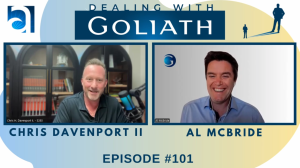Show Notes:
- The linking thread between the subjects you enjoy
- Otto’s deceptively simple, famous quote
- Don’t waste effort and just accept on the one hand, or control what’s controllable on the other
- Why is it so bad to be an opportunist?
- Murphy’s law, Mike Tyson and von Clausevitz all agree
- One thing Rumsfeld got right
- A little fun planning before, to adapt and get unstuck faster
Transcript
Al McBride 0:02
Welcome to the dealing with Goliath podcast. This is a solo espresso episode that I call Mice and Men can float and steer.
Al McBride 0:13
So I heard something there last week, a couple of weeks ago where someone in an interview was asked, What in school? Do you actually remember a major effect on you, as in from subjects rather than from social scenarios.
Al McBride 0:32
This was a fascinating one, because so much in school, you know, we’re there for six or seven years, depending on our school systems, at least just in high school. And what actually lasts, what made a conscious difference.
Al McBride 0:45
There is a ton of stuff that we’ve forgotten and a ton of stuff that’s under the surface. But what we actually remember that had an impact. And recall that my favorite subjects were history, English, and then later on the last few years, business and organization.
Al McBride 1:02
The biz org stuff was fascinating because it was all about people really, okay, there was stuff boring stuff on spreadsheets, but I wasn’t interested in that part. I was interested in the people part. Why is it that some environments create this area of where people can thrive where people can, can, Maslow’s hierarchy of needs can field move up that spectrum to feel more and more fulfillment.
Al McBride 1:29
Yet others absolutely quash stuff want to go above and beyond for their work colleagues or workplace? And that always fascinated me. Why is this one of the different motivations, and was also as a sentence mean Maslow as one, but it was also an awful lot of psychologists that had interesting impacts early on in the late 19th. And then 20th century, so that was always kind of fascinating.
Al McBride 1:54
In English there’s always this idea of, you know, these characters, often with fatal flaws from Shakespeare to modern plays, and literature and novels and prose and whatnot. And that was fascinating as well. Then I realized that history, of course, history is almost is a real people, those same drama stories with massive impact, except they were real.
Al McBride 2:19
They built on things that came before. So it’s almost like, you know, history has its own real fan fiction, you know, so you have these fan fiction stories by fans of Harry Potter or Star Wars or whatever, I don’t know.
Al McBride 2:34
They fill out more narratives in that universe that they love so much. And it occurred to me Well, that’s what history is. Except it’s historians that often get real evidence, hopefully, and create new narratives on on what went on, and how it came to be.
Al McBride 2:55
One of the things that hit me most I remember, I was 14 or 15, or something like this was a quote from Otto von Bismarck. Bismarck, of course, hugely important guy in the 19th century Europe, changed the course of European history, in many ways, he, many would say, was one of the most important people in the unification of Germany. 1870/71, also changing the shift of power from France to Germany in the continent by the Franco Prussian war.
Al McBride 3:27
It’s the same time and quite a remarkably insightful man. No one’s perfect by any stretch. And some historians very much blame for the outbreak, First and Second World War. That’s debatable. He had three principles that when they were adhered to Europe stayed in peace since 1871, essentially, all the way up to the First World War.
Al McBride 3:53
And yet, when they did ditch to three principles, which is for another podcast, they went to war, so that that’s a whole other question. So very important character. But one thing was famous for saying, and he was famous for saying many things, but one thing in particular is famous for saying was, “Man cannot control the occurrence of events, he can only float with them, and steer”.
Al McBride 4:17
I love that. Because he’s always is always talked about often in a nasty way, as an opportunist, always, very opportunist fellow that, as if seeing an opportunity and moving toward us is necessarily a bad thing.
Al McBride 4:35
As if changing your mind midstream to direct another way, is a bad thing when new information comes to the fore, right, but think about that, quote, for a minute. Man cannot control the current of events. He can only flow for them and steer.
Al McBride 4:56
There’s a lot going on there. It’s deceptively simple, and he’s not It’s not trying to say, you know, it’s not trying to say just don’t swim, swim against the tide, because it’s a waste of energy. But on the other hand is also not saying, Oh, just go with the flow. And what happens happens.
Al McBride 5:13
It’s not a total acceptance thing either. It’s actually based, there’s a lovely awareness of acceptance of the circumstances. But it’s also bringing in that stoic quality. This idea of focusing as much of our energy as possible on what you can control, and not trying to control what you can’t.
Al McBride 5:35
This is a cliche since the last 10 or so this sort of all these videos on how to get through the lockdown or whatnot, or control the controllables. And don’t worry about the rational stuff. And it’s, it’s a cliche, because it’s true, because it’s accurate.
Al McBride 5:52
But often when we hear a cliche too many times it loses all value and power and meaning. And this is an interesting point is that we get on the ship, and we steer. So controlling what we control accepting what we can’t.
Al McBride 6:11
This links in with another quote that I remembered from English, which was the famous right there in the title of john Steinbeck, which was the best laid plans of mice men. Which is the name of the book Of Mice and Men, the best laid plans of mice and men go off awry.
Al McBride 6:27
Which is basically you know, Murphy’s Law, if it’s going to go wrong will go wrong. Or, as you know, Mike Tyson famously put it ‘Everyone has a plan until they get punched in the face’, which itself, of course, was derived from supposedly from the great military strategist von Clausewitz, who said ‘No plan survives contact with the enemy’.
Al McBride 6:50
But that quote itself has been attributed to everyone from Sun Tzu to Napoleon, and everyone in the middle. So who knows? Anyway, the point is the same is that it’s a mix between the two things are going to go wrong. We have to be able to adapt.
Al McBride 7:11
But so how often have we been stopped in our tracks by something and not really being able to adapt fast enough? We were surprised by something that popped up unexpected, but wasn’t really that unexpected?
Al McBride 7:23
Because this as an exercise I do with a lot of clients, when we start to work together as I help them plan in a slightly different way than they’re used to we do the normal negotiation or planning for a deal, or for a contract negotiation. But I always add in this extra part, this extra dimension of what what could go wrong.
Al McBride 7:43
What are some of the more likely things to go wrong? This is the the famous Donald Rumsfeld, Don Rumsfeld thing of, you know, there’s the known unknowns and the unknown unknowns.
Al McBride 7:55
And of course, he was ridiculed for this in the press at the time. And yet, it’s one of the most transparent and coherent things that guy probably ever said when he was in public office, which was this basic concept of project management that there are going to be things that you don’t expect, but there’s plenty more things that you do.
Al McBride 8:13
So expect them find a way to, to root them out. I have a particular little game that we play. That’s great fun. And it flips the whole exercise to creating or supposedly over 30% says the research 30% more possibilities of things that can go wrong, so people can plan better, they can insulate them better and adapt faster, because although something might pop up, it’s not a complete surprise.
Al McBride 8:43
Then they have already thought of some standard ways that they could options that they have available to them. So they’re not stuck in an action almost in shock, when something unexpected jumps up. And if this ability to have a plan, even even an outline of a direction, that can help so much.
Al McBride 9:04
Now, I’ll do more about this in subsequent episodes on the ooda loop, which is very much a military fighter jet pilot strategy, a format of how to act react. And also I think, also think maybe more on the 8020 on this idea that you only need certain only a few of your inputs have a huge magnitude as a nonlinear relationship to your outputs.
Al McBride 9:36
As I think they’re all linked, they’re all linked together. A lot of these ideas I came across as I said when I happened to be in school, so that’s for another day, but for the time being. If Mice men can float and steer. And the mice men even though my oft go awry, can adapt and can overcome
Transcribed by https://otter.ai




This Post Has One Comment
Pingback: Trying Harder vs Letting Go (Dealing with Goliath Podcast #017) - Alistair McBride
Comments are closed.